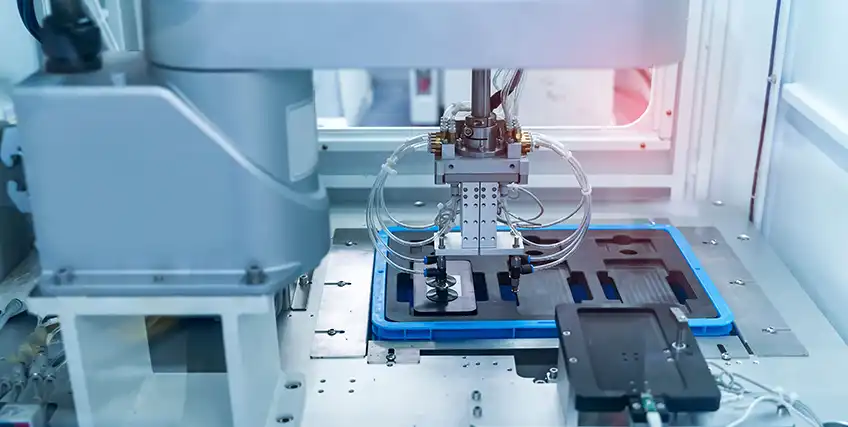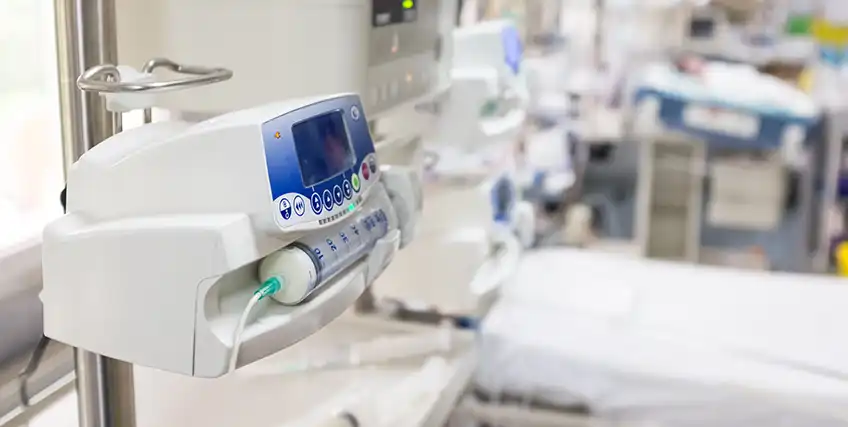Loan For Medical Equipment and Supplies Business
April 01, 2025 | Last Updated on: April 02, 2025

Businesses in the medical industry, from private practices to specialized treatment centers and other healthcare providers, may need medical equipment to provide adequate patient care. Many of these businesses turn to medical equipment and supplies businesses.
The high cost of medical equipment and supplies can restrict cash flow and put a significant dent in a medical practice's working capital. Due to that cost, decision-makers for healthcare businesses and medical practices have to determine if it makes more sense to buy or less medical equipment.
Many businesses may take out a loan for medical equipment, but it's not the only option. There are several medical equipment financing options that are worth considering.
In this article:
- Types of loans that can serve as healthcare equipment financing.
- How to get a loan for medical equipment inventory.
- Common eligibility requirements to get a loan or lease.
Medical Equipment Financing Options
There are several methods of medical equipment financing. You could get a loan for medical equipment or explore medical equipment leasing options. There are pros and cons to each, which we'll get into later, but first, let's look at some of the most common types of medical equipment loans.
- Traditional Term Loans: These conventional loans offer a lump sum upfront payment in exchange for monthly payments based on an interest rate. You can use these flexible loans to finance medical equipment, as a working capital loan, and more. You may need a strong credit score to qualify for these loans and meet revenue requirements.
- Business Lines of Credit: These flexible loans give borrowers access to a pre-approved loan amount, but you only pay interest on the amount you use. With a revolving line of credit, you can withdraw funds to make purchases as needed, repay the amount, and have access to the full amount again.
- Equipment Financing Loans: These specialized loans typically use the equipment itself as collateral, reducing the risk for lenders. A loan for medical equipment like this may offer competitive interest rates and flexible repayment terms.
- SBA Loans: These government-backed small business loans provide a partial guarantee from the U.S. Small Business Administration, which lowers the risk for both borrowers and lenders. SBA loans offer some of the most competitive interest rates and favorable repayment terms on the market, but tend to have a long application process and strict eligibility requirements.
- Vendor Financing: Some medical equipment manufacturers offer their own financing solutions to buyers. A healthcare professional or business gets pre-approved by the vendor, which streamlines the loan process.
- Medical Equipment Leasing: If you don't want a loan for medical equipment to buy it outright, leasing is a good alternative. Leasing is essentially renting the equipment for a negotiated period of time. At the end of the term, you can return the equipment to the lender or buy it.
Pros and Cons of Loans for Medical Equipment
A loan for medical equipment will give you ownership, which can provide additional flexibility, but it's not without drawbacks.
Pros
- Owning the equipment: When you own equipment outright, you have greater control over how you use it, and you won't need to renew it at the end of a lease term.
- Flexibility: A loan for medical equipment could be used for other business expenses, as well. For instance, if you get a large term loan, you can use part of the proceeds to acquire essential medical devices and equipment, and another to fund marketing campaigns, hire new healthcare professionals, and more.
- Longer repayment terms: Loans tend to offer longer repayment terms than leases, giving you more time to repay the debt.
Cons
- Maintenance costs: When you're the legal owner, you're also responsible for maintenance and upkeep. Many leases offer service agreements to reduce maintenance costs.
- Higher payments: Loan payments are usually higher than lease payments because you're paying for the full value of the equipment rather than a portion over a short period of time.
- May require collateral: Many loans require you to put up business assets as collateral, or provide a personal guarantee for the funds which may expose your assets to seizure if you default on the loan.
Pros and Cons of Medical Equipment Leasing
Leasing has a few advantages over loans for medical equipment, but there are also a few cons.
Pros
- Lower payments: Lease payments tend to be lower than loan payments since you're only financing part of the equipment.
- Newer equipment: When you lease, you'll have to either return the equipment or buy it at the end of the term. This gives you the flexibility to always update your equipment with the most cutting-edge technology on the market.
- Uses equipment as collateral: Equipment leases use the equipment itself as collateral. While this means the lender can take back the equipment if you fail to pay the lease, it doesn't expose additional assets to seizure.
Cons
Eligibility for Medical Equipment Financing
Whether you're looking to lease or buy, there are several ways to get a medical loan for equipment. Financial institutions like banks and credit unions, online lenders, and equipment financing companies all exist to help businesses get the capital they need:
- Banks and credit unions: Tend to have more stringent qualification requirements but offer competitive interest rates and loan terms.
- Online lenders: Tend to offer more flexible loan options with simpler application processes and faster funding times than traditional banks. However, they may have interest rates.
- Equipment financing companies: May be more familiar with unique needs of the healthcare industry and offer competitive rates or flexible terms to suit your business.
Regardless of the entity that you choose to use to get a lease or loan for medical equipment, you'll need to meet eligibility requirements. They vary between lenders and are usually more strict at traditional financial institutions than online lenders or financing companies.
Some of the most important factors any lender will consider include:
- Creditworthiness: Your personal and/or business credit score will be reviewed and any loan is subject to credit approval. Better credit will make you eligible for lower interest rates and better loan terms. If you have bad credit, you may have to accept higher interest rates or struggle to secure financing.
- Financial statements: You'll typically need to show financial statements, tax returns, and annual revenue reporting to prove you have the financial resources to repay the loan. In healthcare, you might have to show licenses, too.
- Business plan: A strong business plan that lays out your financing needs and shows how you'll use new equipment or new technology to grow your business and increase profits could help your application.
- Collateral: In many cases, the medical equipment may serve as collateral itself. If you're applying for a larger loan, however, you may need to provide additional collateral.
- Down payment: To lower the risk to the lender, sometimes you'll have to pay an upfront down payment on a loan for medical equipment.
Should I Lease or Get a Loan for Medical Equipment?
There are advantages to leasing equipment or getting a loan, so the right choice for your business really depends on your situation. Some good things to consider before making a decision include:
- Your business needs: Do you only need certain types of medical equipment or do you have several business needs? If you need capital for marketing, hiring, and expanding your practice in addition to equipment, a loan is a better option.
- Interest rates: Taking the time to compare lenders will help you find the best equipment loan interest rates and weigh them against leasing options. Even small rate differences can make a big difference over the life of a loan, so you should compare both options to see what your business can afford.
- Eligibility: If you have a great credit score and financials, you have a better chance of qualifying for favorable loan terms. That's a solid indicator that you should get a loan for medical equipment rather than lease.
- Maintenance and warranties: If you don't want to pay for repairs out of pocket, a lease with a service agreement may be a better option.
- Newness: If you feel it's important that you always have cutting-edge equipment and technology, it's better to lease.
How to Apply for a Medical Equipment Loan
Applying for a loan for medical equipment is just like applying for any other small business loan program. The process varies by lender, but generally it will go like this:
- Assess your funding and equipment needs: Determine your specific needs and get multiple quotes from suppliers to ensure you understand the total cost, including taxes, delivery fees, and installation. If you need funding for more than just equipment, determine the loan amount and monthly payment that you can afford to comfortably repay.
- Compare lenders: Shop and compare banks, credit unions, online lenders, and specialized equipment financing companies to see the best interest rates, repayment terms, and customer testimonials.
- Gather documents: You should ask your lender what you need for the loan application, but it will likely include proof of ownership documents, tax returns, a business plan, and financial statements.
- Submit your application: Depending on the lender, you may be able to apply entirely online. Otherwise, you may have to do it over the phone or meet in person with a loan officer.
- Review loan terms: If approved, you'll receive an offer with the loan amount, interest rate, associated fees, repayment terms, and the total cost of the loan. It could take a few days or several weeks for loan approval and underwriting.
From there, be sure to make on-time loan payments to remain in good standing with your lender and ensure you don't lose the equipment.
Final Thoughts
Getting a loan for medical equipment can help healthcare businesses access new technology and better afford equipment purchases. There are many financing programs available, from conventional loans to medical equipment leasing. Whether you choose to work with a traditional lender like a bank or an equipment financing company, it's important to weigh the pros and cons of buying and leasing to figure out what makes the most sense for your business.
FAQs about Loans for Medical Equipment
Can you use an SBA loan for medical equipment?
Yes, you can use government-backed loans like SBA loans to finance medical equipment purchases. Your business will have to meet eligibility requirements, but SBA loans can offer competitive interest rates and favorable repayment terms.
What financing options can you use for medical equipment?
You can choose to either buy or lease medical equipment. Loans for medical equipment include term loans, SBA loans, and business lines of credit, while lenders and vendors may offer leasing programs.
Should I lease or get a loan for medical equipment?
There are pros and cons to both, and the right option for you depends on your situation. If you'd like to renew equipment every few years and reduce maintenance costs, leasing is a better option. If you have more comprehensive business financing needs and want the security of owning the equipment outright, a loan is a better option.
Can I get vendor financing for medical equipment?
Yes, many vendors and medical equipment manufacturers offer financing directly to buyers. Generally, they're easier to qualify for and can be processed quickly if you get pre-approved.
What do you need to apply for medical equipment financing?
The application process and requirements vary by lender, but generally you will need a strong credit score, a detailed business plan, and financial statements and tax returns that prove your company's profitability and ability to repay the loan.




